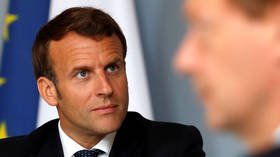The scandal of foreign interference in Washington is not Russiagate, but UAE-gate. But Democrats don’t care because it’s not Putin
The revelation that a close aide of President Trump was allegedly an agent of the United Arab Emirates shows just how clever Abu Dhabi’s been at restructuring America’s Middle East foreign policy. Where’s the outcry?
Thomas Barrack, indicted last week for alleged illegal lobbying on behalf of the United Arab Emirates, was a close aide, inaugural committee head and fundraiser for former US President Donald Trump. Barrack is currently out of jail on a 250 million dollar bond, secured by five million in cash, and has attracted quite a lot of attention for his alleged influence on the Middle East policy of the former president.
Barrack was also only one among three men charged with working to influence Donald Trump’s foreign policy in the lead up to the 2016 presidential elections. Along with conspiracy, he was charged with obstruction of justice and lying in an interview with law enforcement. Also charged was Matthew Grimes, a former executive at Barrack’s company, who got a seven-count indictment; and Rashid al Malik, a wealthy businessman from the UAE who supposedly worked as a direct connection to the regime's ruler.
Funnily enough, alleged UAE meddling in the US has not received anywhere near the amount of attention as the Russiagate hoax. Whereas there was no real evidence ever issued of Russian interference in US democracy, in the case of the UAE allegedly working to reshape US policy under Donald Trump, and apparently using a longtime ally of the president’s to do so, there seems to be real substance. Yet, the US media refuses to pursue the story in anywhere near the obsessive manner that they did with Russiagate, because whether the Democrats or Republicans are in power, the “longstanding partnership” with UAE’s dictatorship remains.
Also on rt.com Trump inauguration chair arrested and charged with acting as unregistered agent of foreign powerThe case should have been enough to make any administration wary of such foreign meddling, but was this enough to make the current president reconsider his close alliance with Abu Dhabi? Not a chance.
In fact, US President Joe Biden has just silently given the go ahead to a Trump era 23 billion dollar weapons sale with Abu Dhabi, doing so while continuing to hold under review a similar arms sale to Saudi Arabia. This is significant in that Riyadh has previously been of much more importance to the US government than Abu Dhabi. The official US position on the weapons sale pause to the Saudis is that they are reviewing whether the weapons will be used offensively in Yemen, a consideration that seems to not have been made with the UAE.
Most importantly, the newly revealed conspiracy to influence US foreign policy prior to and during the first two years of the Trump administration, has perhaps had an irreversible effect on American Middle East policy. It is clear that Trump’s close friend, Thomas Barrack, had promoted the idea of a tight relationship favourable to the “brilliant young leaders'” of the UAE and Saudi Arabia. This meant getting closer to Saudi Crown Prince Mohammed Bin Salman and Abu Dhabi’s Crown Prince Mohammed Bin Zayed al-Nahyan. Besides the record breaking weapons sales to the two Persian Gulf monarchies, what is also key to note is the role that Barrack, and his co-conspirators, allegedly played in getting Trump to back the Saudi-led blockade of Qatar in 2017.
The blockade of Qatar, by the UAE and Saudi Arabia, was alleged to have taken place due to Qatar’s financing of terrorist groups, its support for Hamas and relationship with Iran. Yet the blockade has now been lifted and, if anything, Doha’s relationships with Iran and Hamas have only grown stronger. This blockade also worked to eventually isolate the Hashemite Kingdom of Jordan, among other Arab nations which were hesitant to get on board with the initiative.
Also on rt.com WATCH: Bahrain, UAE and Israel sign ‘Abraham Accords’ peace deal at the White HouseDuring the years of the Trump administration, US policy shifted dramatically towards a UAE-Saudi bias, which even undermined King Abdullah II of Jordan. Later, with Trump’s so-called ‘Deal of the Century’ and Arab normalisation deals with Israel, again Jordan and even Egypt, two crucial US Middle East allies, were severely sidelined. Jordan, one of the US’ closest allies in the Arab world for decades, was also left in the dark whilst rumours spread about plans to place custodianship over the al-Aqsa Mosque site in Jerusalem, into the hands of Saudi Arabia’s rulers instead.
Earlier this April, Prince Hamzah of Jordan was allegedly involved in a coup attempt or, as the nation’s authorities call it, a “plot to destabilise the country,” which the King is still hesitant to point fingers over. Involved in the alleged plot against the monarch was an influential businessman named Bassem Awadallah, who served as an adviser to the Saudi Crown Prince and lived primarily in the UAE. It is alleged that the plot was orchestrated with the influence of both the Saudis, Emiratis and Israel’s former Prime Minister Benjamin Netanyahu.
Under Joe Biden’s government it does seem that an effort is being made to mend ties with the Hashemite Kingdom of Jordan, whilst a more balanced relationship with Riyadh is underway. However, the administration is yet to challenge the UAE at all and seems to be suffering the consequences of the pro-Abu Dhabi foreign policy of the previous administration, while attempting to mend the damage. The million dollar question now remains: will Biden continue to develop his alliance with the UAE and if so, will the US mainstream media continue to pretend like there’s no problem with a foreign government working to direct American foreign policy, when that foreign government is an ally?
Think your friends would be interested? Share this story!
The statements, views and opinions expressed in this column are solely those of the author and do not necessarily represent those of RT.














